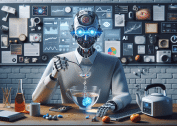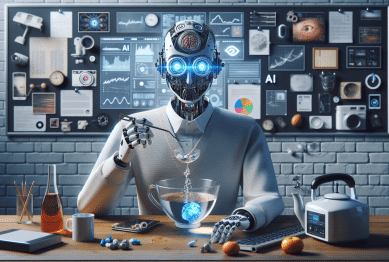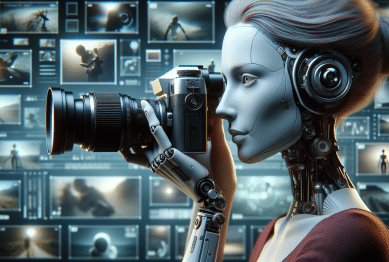Artificial intelligence already impacts countless aspects of daily living, from how you shop online to the suggestions on your favorite streaming service. This guide unpacks how AI works behind the scenes to power tools, boost convenience, and fuel innovation in ways you might not expect.
The Evolution of Artificial Intelligence in Daily Routines
Artificial intelligence is no longer reserved solely for scientists and specialized labs. It now exists at the heart of many devices in homes and pockets. Everyday tasks, such as unlocking smartphones with facial recognition or receiving personalized recommendations for shows and products, are built on complex AI systems. These digital helpers improve with every interaction, analyzing patterns in your habits and tailoring responses to personal preferences. The rapid expansion of machine learning allows AI to detect user needs, predict requests, and make technology feel almost intuitive. Individuals benefit from convenience and smoother experiences because of these continuous, automated improvements across platforms.
The integration of AI in personal routines also changes the way many approach work and communication. Virtual assistants process voice commands, answer simple questions, and even schedule meetings, allowing people to manage their time more effectively. Meanwhile, AI-driven customer service chatbots resolve issues without requiring live agents, making support accessible outside typical business hours. In busy professional settings, this improves productivity and enables staff to focus on more complex tasks. What was once manual and repetitive is now handled by intelligent software, reshaping expectations about workflow in modern life.
AI’s reach continues to extend beyond just convenience. It helps power safety features, such as spam filters for email or fraud detection for banking. This reduces risks and saves users from potentially harmful situations. Smart navigation apps utilize AI to suggest quicker, less congested routes based on real-time traffic data. These advances reveal a trend: AI is increasingly woven throughout everyday experiences, quietly shaping safer, more efficient, and personalized environments without most people even noticing.
AI in Entertainment: Personalizing Experiences
Streaming services rely on artificial intelligence to keep users entertained for longer periods. Algorithms assess viewing habits and generate accurate recommendations, so users quickly discover movies, series, or music that align with their interests. Personalized features not only boost engagement but also improve satisfaction by reducing time spent searching. For those curious about the latest technology trends, AI’s central role in entertainment highlights its abilities to analyze subtle behavioral cues and adapt accordingly. These recommendation systems use big data to identify hidden preferences and continually fine-tune suggestions for each individual profile.
Video games also benefit from advanced machine learning. AI adapts in real time, creating smarter opponents that adjust to player actions, or evolving environments that challenge strategy and reflexes. Procedural content generation, powered by AI, means every game session can feel unique and unpredictable. This continuous innovation keeps experiences fresh, attracting both new and seasoned gamers. AI’s influence in gaming expands creative possibilities, resulting in richer narratives and more engaging gameplay.
AI-driven audio assistants, like those embedded in smart speakers, respond to voice commands and help set the mood with custom playlists or podcasts. With ever-improving speech recognition, these assistants can distinguish context or emotional tone, ensuring more accurate results. As these technologies grow, they allow for seamless, immersive experiences that anticipate needs and understand personal taste. Entertainment is rapidly evolving with AI at its core, reflecting a shift toward hyper-personalized interaction.
Shopping, Finance, and AI: Smarter Decisions
Online shopping platforms deploy sophisticated artificial intelligence tools to personalize product recommendations and streamline checkout. By tracking browsing behavior, purchase history, and even time spent viewing items, algorithms suggest new goods that are more likely to be of interest. This enables shoppers to find what they need faster, leading to higher satisfaction and a more efficient digital shopping journey. AI-driven price comparisons and flash alert systems also help customers identify affordable choices across major retailers.
In the financial sector, AI takes proactive steps to secure digital transactions and safeguard accounts against fraudulent activity. Complex networks scan for irregular patterns, often detecting unauthorized purchases or identity theft attempts before they escalate. Many credit card providers integrate AI-based virtual agents to help resolve disputes, monitor scores, or offer spending insights—all within a single app interface. These improvements generate greater peace of mind for users and allow more precise financial planning based on real-time data analytics.
AI is changing how investment opportunities are discovered as well. Robo-advisors analyze individual risk tolerance, long-term goals, and market projections to optimize asset allocations in diverse portfolios. This automation once required professional intervention is now available to a wider portion of the population, allowing even novice investors to access smart guidance. With AI driving more intelligent decision-making, both average consumers and market experts gain tools to manage finances with increased confidence and accuracy.
AI and Smart Home Technologies
Smart home devices integrate artificial intelligence to automate routine activities and improve comfort and security. Think of thermostats that learn preferred temperature settings or lighting systems that adjust based on occupancy. Sensor-rich environments, combined with AI processing, anticipate resident needs and eliminate repetitive manual adjustments. This not only cuts energy usage but also enhances convenience, creating homes that actively respond to their inhabitants’ lifestyles.
Home security has transformed with AI-powered surveillance. Cameras equipped with facial and motion recognition distinguish between people, pets, and potential threats in real time. When unfamiliar patterns are detected, instant alerts are dispatched to homeowners, enabling prompt action. Some systems even integrate with local emergency services or neighborhood communities for enhanced collective protection. These smart solutions simplify managing properties—no matter where residents are.
Appliances are also getting smarter. AI enables refrigerators to track inventory and notify when groceries run low, or washing machines to adjust cycles based on fabric sensitivities. With voice-enabled controls, routines like brewing coffee or vacuuming can be initiated remotely with a simple command. This level of automation not only saves time but also reduces stress, freeing homeowners to focus attention on more meaningful activities.
Healthcare and AI: Innovation and Accessibility
Healthcare stands to benefit enormously from ongoing artificial intelligence adoption. AI models review patient histories and imaging scans, spotting signs of disease or subtle changes that human eyes could miss. This early detection supports faster intervention and potentially improves prognoses. In primary care, chatbots quickly provide health advice, schedule appointments, and answer common queries, easing demand on overstretched providers while offering basic guidance to a broader audience.
Drug research has accelerated dramatically because AI can simulate how compounds interact with human tissue, reducing trial and error. Large-scale analysis of data from clinical trials supports safer, more effective treatments, and a quicker route from lab to pharmacy. In personalized medicine, AI sifts through genetic profiles, tailoring therapies to each patient’s specific needs. These technologies point toward better overall health outcomes and more personalized care.
Remote patient monitoring has also become easier with AI-powered wearable devices. These gadgets measure vital statistics around the clock, alerting users—and healthcare professionals in some cases—if readings fall outside of healthy ranges. Such proactive monitoring means chronic conditions can be managed more effectively, potentially preventing emergencies or hospitalizations. As AI continues to evolve, expect healthcare innovations to become ever more accessible and impactful.
Ethics, Responsibility, and AI’s Place in Society
With artificial intelligence playing an ever-larger role in daily life, discussing ethics and responsibility becomes critical. AI systems can reflect the biases found in data used to train them, which may lead to unfair outcomes or discrimination. Transparency and accountability in algorithm design are vital to ensure these systems serve communities fairly and responsibly. Many organizations, including governments and universities, actively research ethical AI, promoting guidelines that prioritize privacy and informed consent.
Data security is also a growing concern. As AI systems collect and process ever-more detailed personal information, robust protections must be put in place. Regulations like GDPR establish strict protocols for handling personal data and require organizations to notify users about how their information is used. Collaboration between technology companies, policymakers, and the public will be essential to ensure ongoing trust in artificial intelligence-powered products and solutions.
Finally, the social impact of AI cannot be ignored. Technologies that streamline tasks may also change job markets and require new kinds of education and digital literacy. Adaptation and upskilling will help citizens thrive alongside rapid automation. Thoughtful deployment, paired with continuous oversight, gives societies a way to maximize benefits while minimizing risks—so everyone can safely enjoy the promise of tomorrow’s intelligent technology.
References
1. National Institute of Standards and Technology. (n.d.). Artificial Intelligence. Retrieved from https://www.nist.gov/artificial-intelligence
2. Pew Research Center. (n.d.). AI and the Future of Humans. Retrieved from https://www.pewresearch.org/internet/2021/06/21/experts-say-the-rise-of-ai-will-make-most-people-better-off-over-the-next-decades-but-many-have-concerns-about-how-advances-in-ai-will-affect-what-it-means-to-be-human-to-be-productive-and-to-exercise-free-will/
3. World Health Organization. (n.d.). Ethics and Governance of Artificial Intelligence for Health. Retrieved from https://www.who.int/health-topics/artificial-intelligence#tab=tab_1
4. U.S. Food and Drug Administration. (n.d.). Artificial Intelligence and Machine Learning in Software as a Medical Device. Retrieved from https://www.fda.gov/medical-devices/software-medical-device-samd/artificial-intelligence-and-machine-learning-software-medical-device
5. European Commission. (n.d.). Ethics guidelines for trustworthy AI. Retrieved from https://digital-strategy.ec.europa.eu/en/policies/ethics-guidelines-trustworthy-ai
6. Brookings Institution. (n.d.). The future of work in the age of artificial intelligence. Retrieved from https://www.brookings.edu/research/the-future-of-work-in-the-age-of-artificial-intelligence/









